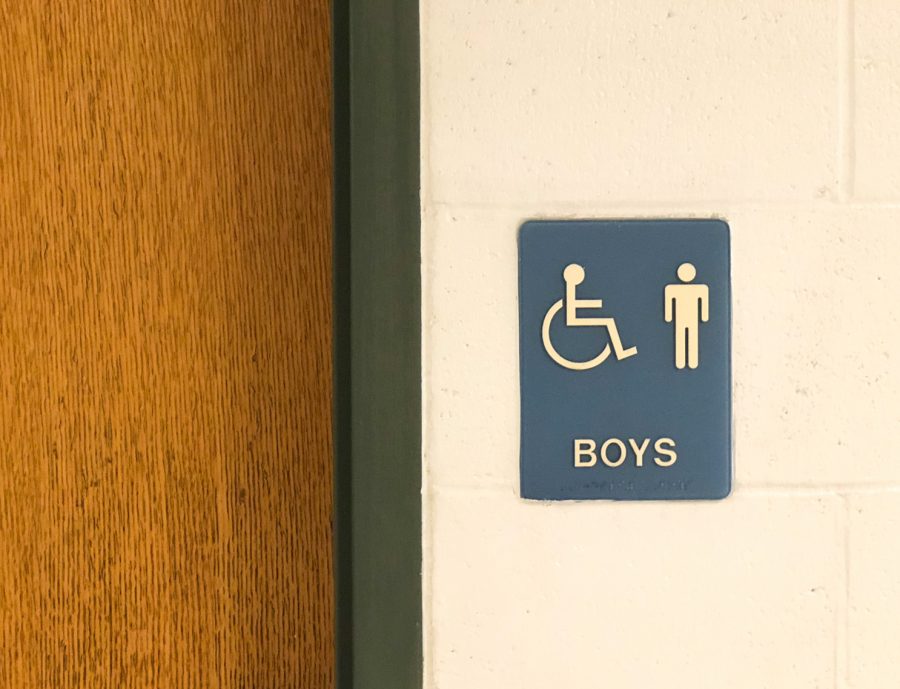Q3, Through the Eyes of Who it Affects Most
The debate over Question 3 has largely centered around use of public restrooms.
October 23, 2018
Eli Fano wakes up at 6:00 A.M. every morning. He shoos his cat off his bed, dresses, brushes his teeth, and drinks some coffee. He then leaves for school, where he uses the men’s restroom- nothing extraordinary, except that his ability to do so is now up for debate.
Eli is openly transgender. “I’ve known since before freshman year,” the senior says of his gender identity. Eli is one of a growing number of openly transgender and nonbinary students at Hingham High; when he came out in sophomore year, he says, he did not know any other students who were openly trans or nonbinary.
Since transitioning, Eli has been able to use the men’s restroom thanks to a 2016 state law that defends transgender individuals’ ability to use the bathroom that corresponds with their gender identity. But on November 6, Eli- and other students like him- may be stripped of this right.
Massachusetts ballot question #3 asks voters to decide whether the state should continue transgender protections. The law up for referendum prohibits discrimination on the basis of gender identity in any public accommodation. Though the protections are broad, protecting non-cisgender individuals from discrimination in restaurants, movie theaters, schools, etc., the debate has largely focused on the use of bathrooms and locker rooms.
A “Yes” vote continues the already existing protections, while a “No” vote would repeal them.
The ballot question is the result of a signature campaign from the Massachusetts group Keep MA Safe. On their website, the group argues that the law “…endangers the privacy and safety of women and children in public bathrooms, locker rooms, showers, dressing rooms, and other intimate places, because anyone—regardless of intentions or anatomy—can be there at any given time.”
Kristen Arute, the Republican challenger for state representative in Hingham’s district, does not support continuing protections. She wrote in an email to The Harborlight, “This law is ripe for abuse… We can sensitively address the specific needs of transgendered individuals in a more appropriate way – a way that is safer for ALL involved.”
On the opposite side, the coalition Freedom Massachusetts argues the law is stringent about not allowing abuse- it prohibits entry of bathrooms for any “improper purpose.” Further, a 2018 study from the UCLA Williams Institute shows MA’s transgender protection laws, in place since 2016, “…do not affect the number or frequency of criminal incidents in restrooms, locker rooms or changing rooms… reports of privacy and safety violations in these places are exceedingly rare.”
State Representative Joan Meschino, State Senator Patrick O’Connor, and his Democratic challenger Katie McBrine are all in favor of a “Yes” vote. Governor Charlie Baker has personally donated $500 to the “Yes” campaign.
Because of the statistical evidence against the arguments of Keep MA Safe, Eli sees the law as an attack on transgender individuals. “There’s no other feasible reason. They don’t want to protect people who would be at risk because of their gender identity. And trans folk fall under that category, we are people who are at risk because of our gender identity.”
Principal Swanson told The Harborlight that it is his “expectation (and hope)” [sic] that students will always be able to use their preferred restrooms at HHS, though he notes the school board will have the ultimate authority. Still, Eli fears for the consequences outside of the high school, should voters repeal the law. “I’ve had to use the women’s room before… and I’ve gotten looks. I’ve gotten really concerned looks,” he recounts.
The debate over Question 3 has taken a toll on Eli. “My identity is politicized. My entire being is a matter of political opinion,” he asserts. “I would not like to be the subject of political discussion.”
Because of the ballot question, he explains, “I have to defend my worthiness to be protected under law. And that’s…” he trails off, struggling to find the words. Finally, he simply says, “…humiliating.”
Recent polling suggests that Massachusetts voters will keep the law, but Eli, who is 17, will not be able to be one of those voters. “[Not being able to vote] enrages me,” he confesses.
To those who can cast a ballot on November 6, Eli says, “Vote to keep [the law]. Even if it doesn’t affect you, it affects someone in your community. Those gender protections keep someone safe. They keep people from being uncomfortable, being thrown out of restaurants, being denied care in doctor’s offices. Those protections only serve to help people, and getting rid of them would only serve to hurt.”


































